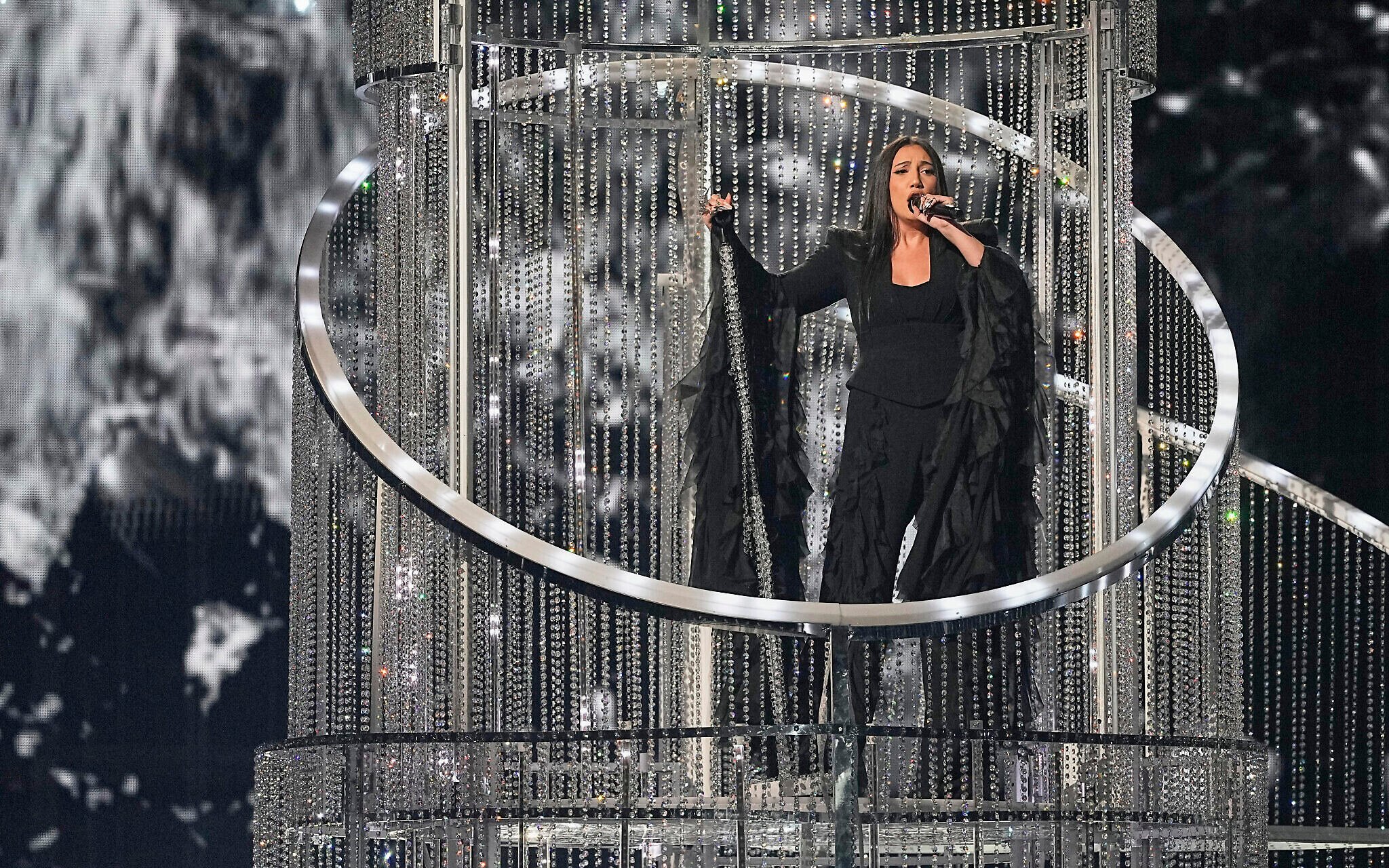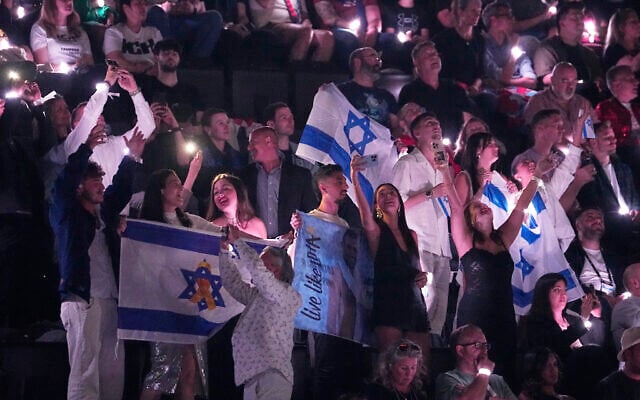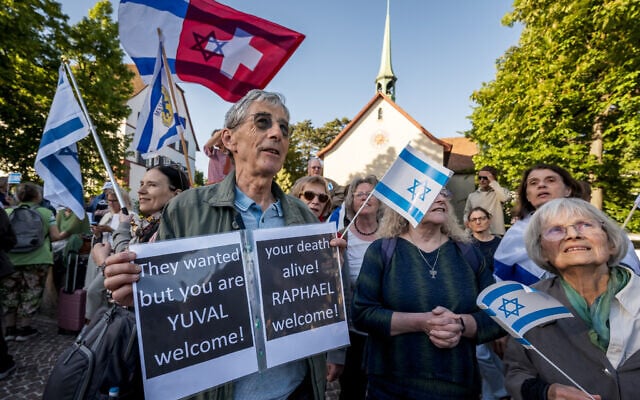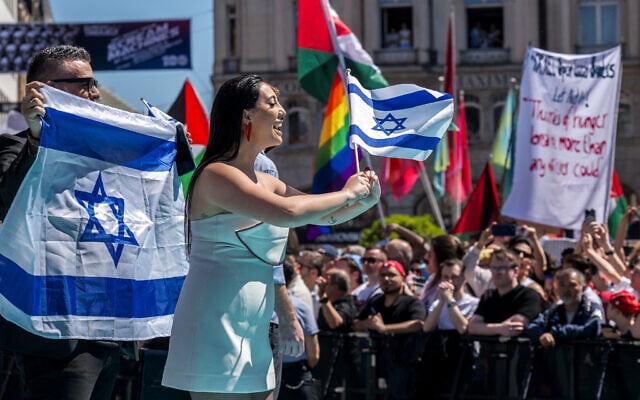



Israel’s Yuval Raphael advanced to the grand final of the 2025 Eurovision following her performance in Thursday night’s semifinal.
The 24-year-old from Ra’anana, a survivor of the October 7 Nova music festival massacre, turned in a strong performance of her emotional ballad, “New Day Will Rise,” in front of the crowd in Basel, Switzerland.
While those in the arena said a smattering of boos could be heard during her performance, only cheers could be heard on the live TV broadcast. There were also only a small number of Palestinian flags visible in the audience, despite fears of a strong presence.
During her performance, Raphael ascended a staircase in an enormous chandelier and stood on a balcony that Israeli producers said was meant to be a “symbolic nod” to the famed image of Zionist visionary Theodor Herzl on a balcony in Basel during the Fifth Zionist Congress in 1901.
After exiting the stage, Raphael said she somehow spotted in the crowd her fellow survivors from the roadside bomb shelter where she hid under dead bodies for hours on October 7 until she was rescued.
“I looked to the side, I said hi to the crowd, and I spotted my friends from the shelter,” Raphael said in a video shared by the Kan public broadcaster. “Suddenly I saw my best friend waving, way up high, and somehow I spotted them, I was in shock. It gave me so much strength.”
Raphael qualified on Thursday along with Lithuania, Denmark, Malta, Latvia, Armenia, Austria, Greece, Luxembourg and Finland.
She will compete during Saturday night’s grand final against those acts and the qualifiers from Tuesday’s semifinal — Iceland, Poland, Estonia, Sweden, Ukraine, Portugal, Norway, San Marino, Albania and the Netherlands — plus the Eurovision “Big Five,” the UK, Germany, France, Italy, Spain, and last year’s winner, Switzerland.
The full results of the semifinals — which are based solely on a public vote — are only released by producers after the grand final.
Unlike the semifinals, the results of the grand final will be based on a 50/50 mix of the televote and the jury vote — in which professional juries from all 37 participating countries pick their favorites.
Small dueling pro-Israel and anti-Israel protests were held in Basel on Thursday evening, and a larger anti-Israel protest is slated for Saturday night, though efforts appear to pale in comparison to demonstrations last year in Malmo, Sweden.
Earlier Thursday, during a live dress rehearsal, a small group of people booed and waved Palestinian flags during Raphael’s performance.
The Swiss Broadcasting Corporation, which is organizing this year’s events, said in a statement that the group had flags that were outside the size restrictions and that “security personnel were able to quickly identify those involved and escort them out of the hall,” adding that “the organizers are committed to a neutral, safe, inclusive and respectful environment at the ESC.”
A number of letters and public calls sought to have Israel barred from the competition, including from a handful of European Parliament MPs and a few dozen former contestants and last year’s winner. The public broadcasters of Iceland, Spain, Slovenia and Ireland, who are all participating in this year’s Eurovision, also lodged complaints with organizers against Israel’s inclusion, but did not pull out of the contest in protest.
The European Broadcasting Union remained steadfast in rejecting such calls both this year and last, maintaining that it is a competition between public broadcasters, not governments, and that Israel’s Kan is fully eligible to take part.
German Culture Minister Wolfram Weimer told parliament on Wednesday that “the boycott calls, the threats, also the verbal attacks on the singer from Israel, who herself only survived Hamas’s mass murder at the Nova music festival because she hid under corpses, are from my point of view an intolerable scandal.”
About 200 people, many draped in Palestinian flags, protested in central Basel on Wednesday evening, demanding an end to Israel’s military operations in Gaza and the country’s expulsion from Eurovision. They marched in silence down a street noisy with music and Eurovision revelry.
A large number of Palestinian flags could be seen along the processional route during the “turquoise carpet” event on Sunday night, the official Eurovision opening ceremony.
Israel’s Kan public broadcaster, which organizes Israeli participation in the event, filed a complaint with Swiss police after a man waving a Palestinian flag and wearing a keffiyeh made a throat-slitting gesture toward the Israeli delegation and spat at them. Kan said that Swiss police took statements from witnesses and vowed to fully investigate the incident.
Rules on flags are stricter during the live shows, with no flagpoles allowed, the size of the flags limited and only one flag allowed per audience member. The rules were also tightened this year for artists, only allowing them to display their own country’s flag at any official events.
A tongue-in-cheek song titled “Made in Switzerland” sang during an interval at the first semifinal on Tuesday included the line “And now you understand that/ like the Swiss, Eurovision is non-political, strictly neutral/ Doesn’t matter if you’re good or brutal,” which was interpreted by many viewers as referring to Israel’s inclusion.
Israel has won the competition four times in its 52-year run: in 1978, 1979, 1998 and most recently in 2018, with Netta Barzilai’s “Toy.” Though a number of countries expressed disapproval of Israel hosting the 2019 show in Tel Aviv, ultimately none of them dropped out of the contest.
Agencies contributed to this report.



